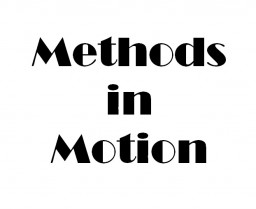 The experimental philosophy movement, or ‘XPhi’, has recently emerged as an approach within philosophy that sets out to borrow experimental methods from psychology. It aims to diversify the methodological toolkit of traditional philosophy, and is very relevant to my own work. I would argue that the XPhi movement has been useful in generating fertile debates about 'how we know', and in interrogating the role of 'lay' and 'expert' understandings for guiding philosophical enquiry. However, I would also argue that existing work in XPhi has suffered from methodological shortcomings and shortsightedness.
The experimental philosophy movement, or ‘XPhi’, has recently emerged as an approach within philosophy that sets out to borrow experimental methods from psychology. It aims to diversify the methodological toolkit of traditional philosophy, and is very relevant to my own work. I would argue that the XPhi movement has been useful in generating fertile debates about 'how we know', and in interrogating the role of 'lay' and 'expert' understandings for guiding philosophical enquiry. However, I would also argue that existing work in XPhi has suffered from methodological shortcomings and shortsightedness.
Let me start by describing a commonly used device in traditional analytic philosophy – the thought experiment. To illustrate, I'll describe a thought experiment that has been extremely influential in epistemology (the philosophy of knowledge), and which is often treated as evidence against the long-held theory of knowledge as 'justified true belief' (which I will explain in a moment).
One version of the thought experiment, the 'Cow in the field' (scenario taken from Cohen, Martin. (2999, 2007). 101 Philosophy Problems. Routledge.), goes something like this: A farmer checking up on his favourite cow confuses a piece of black and white paper caught up in a distant bush for his cow. However, since the animal actually is in the field, but hidden in a hollow, the farmer has a justified, true belief that his cow is in the field. However, in this situation, we would not, intuitively, say that the farmer 'knows' that the cow is in the field.
Many variations on this thought experiment in epistemology, now famously known as 'Gettier cases' (after Gettier, 1963), have been presented. Such thought experiments are intended to elicit intuitions, which can be taken as evidence to inform philosophical theory. Note, though, that philosophers have not traditionally gone out to test what actual lay people might say in response to such scenarios. Rather, the point is to use thought experiments as devices to help engage in reflective analytic argument and practice amongst theorists.
So what do thought experiments have to do with experimental philosophy? Well, in a nutshell, experimental philosophers have suggested that we do need to go out and test actual lay peoples' intuitions when making claims about 'what we would say' in response to thought experiments, such as the one described above. I have carried out work that, although predating the XPhi movement, adopts essentially the same approach and proposes a new methodology for testing 'folk intuitions'. This work (Hewson, 1994) involved testing what – to me at least – appeared to be clearly empirical claims made by the philosopher Stephen Stich. His work made claims about what lay people would say in response to certain thought experiments, which he devised to elicit intuitions about 'beliefs'. In short, I found that when I actually asked people what they thought, they did not respond in the way that Stich predicted. This, therefore, contested his claims about the nature of the folk concept of belief. Further, my empirical work showed that factors which were 'philosophically irrelevant' (i.e. according to philosophical theory should not influence peoples' intuitions) did have an effect on the judgements people made.
Since my own early work, a flurry of activity in XPhi has led to similar discoveries across a range of domains. These indicate that the way actual research participants respond is often at odds with the claims of philosophers. (Note: the empirical status of philosophical claims about folk intuitions is a current topic of hot debate, but this issue is beyond the scope of the present discussion). Furthermore, supposedly philosophically-irrelevant factors, such as culture and gender, also affect lay peoples' intuitive judgements. XPhi has demonstrated how interdisciplinary cross-fertilisations can be fruitful in instigating methodological innovation. However, some of the work has failed to employ the basics of methodological good practice, such as reporting effect sizes, appropriate statistical analysis tests, and (in the worst cases!) actual sample sizes.
Looking to the future, it seems that greater involvement of psychologists (and, more broadly, social scientists) may benefit the XPhi movement, both by helping to address the aforementioned methodological shortcomings, and by expanding the range of methodological tools and approaches employed. Conversely, empirical psychology may benefit from the conceptual clarifications and distinctions offered by philosophers. Certainly, I have found such benefits in my own work on investigating folk psychological understandings.
Methods In Motion
The Methods in Motion blogs are by researchers linked to the Centre for Citizenship, Identities and Governance. The blogs represent their opinions emerging from research in progress, and do not necessarily represent the views of the Research Centre or Open University. You can discover more about Methods in Motion on the CCIG website.






Rate and Review
Rate this article
Review this article
Log into OpenLearn to leave reviews and join in the conversation.
Article reviews